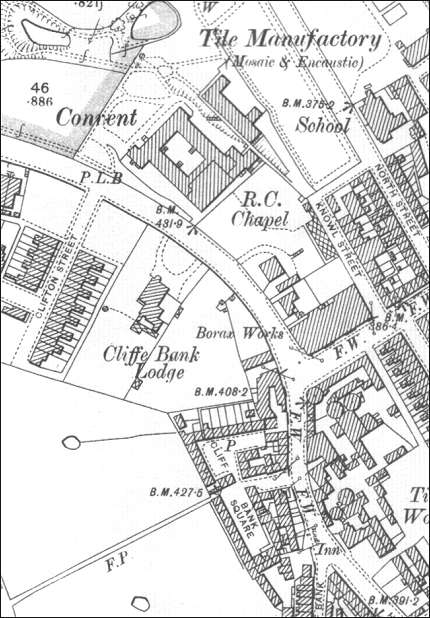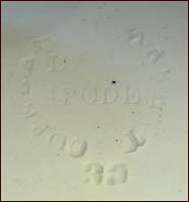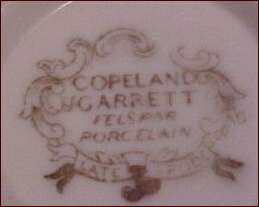![]()
![]() |
index: G |
|
index: G |
Thomas Garrett
[ Web Site Index ]
| Thomas Garrett | People from Stoke-on-Trent | |
|
|
|
|
Thomas Garrett |
[ Web Site Index ] |
Garrett, Thomas b.1785 d.1865
After Josiah Spode III died in 1829 the Spode Pottery business was carried on by his executors until 1833 when the entire concern was purchased by Alderman William Taylor Copeland. Shortly afterward he took into partnership his principle traveller, Thomas Garrett and the firm continued until the partnership was dissolved in 1847.
"Near to Cliff Ville, is Cliff Bank Lodge, a handsome villa, recently erected by Thomas Garrett, Esq., resident partner of the firm of Copeland and Garrett."
For the year 1839 Thomas Garrett was appointed the Returning Officer for the Borough of Stoke-upon-Trent, by the High Sheriff, according to the direction of the Reform Act.
Ward, John; The borough of Stoke-upon-Trent,1843.
T. Garrett's obituary appeared in the "Art Journal" Vol 4. 1865.

1898 OS map showing Cliffe Bank Lodge - the home
built for Thomas Garrett
- by the time of the 1881 census
Cliffe Bank Lodge was occupied by
William F. DREW and his family (Manufr Of Pottery - Employing 493 Hands)


Copeland & Garrett marks
[often with the wording "Late Spode"]
|
The principle entertainment was an excellent dinner given to the young men and women, and the adults, on Thursday. These persons, numbering nearly 700, assembled at the manufactory, shortly after eleven o'clock, where they formed a procession, three abreast, and went through the principal streets of the town - the bells ringing merrily the while. Admirable arrangements having been made, the party, on their return, found a plentiful repast awaiting them, laid out in three long rooms of the manufactory, which were prettily decorated with laurels and other ever-greens. The fare consisted of offitorious meats, (provided under the superintendence of Mr Yates of the Talbot, and Mr Fiddler, of the Wheat Sheaf) - the good old English dishes of roast beef and plumb pudding, predominating. Justice having been done to these substantial evidence of hospitable feeling, many were the kindly greetings, the good wishes, and the benevolent sentiments uttered over cups of "nut-brown ale." T. Garratt, Esq., visited the several rooms during the dinner, and by his kindness and affability conducted greatly to the pleasure universally felt. It would occupy too much of our space if
we were to enumerate all the toasts, addresses, and songs, which
followed the withdrawal of the cloth; they were such as displayed
sociality and hilarity of feeling, and respect to the "founders of
the feast." The entertainment did not close until about seven o'clock, when "God save the King," having being sung, the guests retired, good order having being maintained throughout. Yesterday morning, a breakfast of tea and coffee, and meats of various kinds, was given to the children employed in the establishment, about two hundred in number. Mr Garratt was present on this occasion also. The juvenile party evidently enjoyed the treat to its fullest extent, and their happy countenances furnished a still richer treat for those who were witnesses of their enjoyment. Like their seniors, they had a procession, of three abreast, through the town. After the breakfast, they made spoil of the laurel, etc. and bore boughs of it in a second precession to the front of the works. North Staffordshire Mercury, 15 November 1834 |
EVIDENCE TAKEN IN THE STAFFORDSHIRE POTTERIES By SAMUEL SCRIVEN, Esq.
![]() on Scriven Report on
Child Labour (1840)
on Scriven Report on
Child Labour (1840)
| Messrs. COPELAND AND GARRATTS, Stoke-upon-Trent. | |
| Scouring Room | |
| No. 46 - Richard Herley, | aged 24 |
| I
am the clerk in this department (Scouring Room); have but one room,
which is used only for drying the ware. I have been in the works 5
years, in this room 3 months; have the management of the men and settle
their wages; they are paid by the piece, I am paid by the week. My duty
is to examine and place the ware. They come at 6½ and remain till 9, Mondays to Saturdays excepted, when they come at 6½ and stay till 6; they go home to their dinners. The room is damp from the steam of the ware, but should not say the employment was either unhealthy or laborious. We have one boy in the room between 9 and 10 years old; he carries the broken ware out, sweeps the room, looks after the fire, and cleans the engine turning-house: the machinery is distant from the engine; he has nothing to do with the machinery, the men attend to that. |
|
| Messrs. COPELAND AND GARRATTS, Stoke-upon-Trent. | |
| No. 48 - Thomas Howell, | aged 50 |
| I
am foreman of this department; have been a potter 38 years; in the
turning way 25 years; all the lathes are turned by machinery; we have
the means of stopping the whole of the lathes and throwing tables at a
moment's notice, but we must run into the cellar to do it;
sometimes accidents do occur, but they are rare; we have 10 turners; no
boys except one to sweep the room and do little odd jobs; they are all
paid piece-work; I am paid by the week; we have no such thing as
truck-work; they all get hard cash. They come at 7, leave at 6; if many
orders in hand they stay till 9, when they get extra pay. In some kinds of heavy work we prefer the steam, as possessing the greater power; in the lighter work I think hand-power best, as the movements are soon answered. There is nothing peculiarly pernicious in the nature of the work: the temperature is sometimes high and detrimental, and the confinement is bad; but, on the whole, I do not think it unhealthy. The ware is sent from hence to the Greenhouse or handlers-room. |
|
![]() Information on Spode
Information on Spode
![]() 1956
article on W T Copeland
1956
article on W T Copeland
28 March 2004